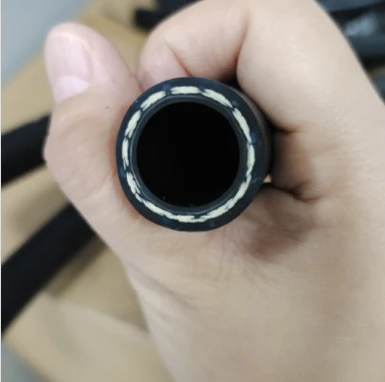bulk fuel hose
Nov . 20, 2024 05:08 Back to list
bulk fuel hose
Understanding Bulk Fuel Hose Essential Components for Safe Fuel Transport
Bulk fuel hose plays a critical role in the transportation and management of various types of fuels. Whether it’s diesel, gasoline, or other liquid petroleum products, the integrity and efficiency of the hose can significantly impact the safety and effectiveness of fuel distribution systems. This article explores the essential features and considerations regarding bulk fuel hoses, ensuring a comprehensive understanding of their importance in fuel handling operations.
What is Bulk Fuel Hose?
Bulk fuel hose is a specialized type of flexible tubing designed to handle the transfer of fuel from one location to another. Typically durable and high-performing, these hoses are engineered to endure the rigors of fuel transfer environments. Manufactured from specific materials such as rubber, thermoplastics, or composite materials, they are designed to resist corrosion and degradation caused by exposure to various fuels and environmental factors.
Key Features of Bulk Fuel Hoses
1. Chemical Resistance One of the primary considerations for any bulk fuel hose is its resistance to various petroleum products. High-quality hoses are tested and rated for compatibility with different fuels, ensuring that they won’t degrade or react negatively when in contact with specific fuel types.
2. Temperature Tolerance Fuels can be stored and transported in diverse temperature conditions. A bulk fuel hose needs to maintain its performance and safety across a wide temperature range. This attribute is critical to prevent leaks or failures during extreme weather conditions.
3. Pressure Ratings Fuel hoses are rated for different pressure levels, which dictate their suitability for various applications. Depending on the type of fuel and the transfer system, it is crucial to select hoses that can safely handle the pressure without bursting or leaking.
4. Construction and Reinforcement Many bulk fuel hoses come with multiple layers of construction to enhance durability and strength. Reinforcements using materials like wire braid or fabric can provide additional support, particularly for high-pressure applications, ensuring that the hose remains intact under strenuous conditions.
5. Safety Standards and Certifications Compliance with industry standards is paramount in the selection of bulk fuel hoses. Regulations from agencies such as the American Petroleum Institute (API) or Underwriters Laboratories (UL) help ensure that hoses meet specific safety and performance benchmarks, thereby reducing the risk of hazardous incidents during fuel transfer operations.
Applications of Bulk Fuel Hoses
bulk fuel hose

Bulk fuel hoses are employed in a variety of applications, showcasing their versatility
- Fuel Delivery Systems Used in fuel transport vehicles, these hoses enable the efficient delivery of fuels to various locations such as gas stations, industrial sites, and construction areas.
- Storage Systems In fuel storage facilities, bulk fuel hoses are utilized to transfer fuel from storage tanks to distribution systems, ensuring a smooth and reliable flow.
- Marine Fuels In maritime applications, specialized hoses are designed to withstand exposure to seawater and other harsh conditions while facilitating the safe transfer of fuels to ships.
Best Practices for Bulk Fuel Hose Maintenance
To maximize the lifespan and performance of bulk fuel hoses, adhering to maintenance best practices is essential
- Regular Inspections Frequent checks for cracks, abrasions, or signs of wear can help identify potential issues before they lead to catastrophic failures.
- Proper Storage Storing hoses in controlled environments away from direct sunlight and extreme temperatures when not in use can help maintain their integrity.
- Understanding Operational Limits Always operate within the working limits of the hose, including pressure and temperature specifications, to prevent undue stress and potential failure.
Conclusion
The importance of bulk fuel hoses in the fuel transportation industry cannot be overstated. They play an integral role in ensuring that fuel is transferred safely and efficiently, minimizing the risk of spills and leaks. Understanding the characteristics, applications, and maintenance of these hoses allows businesses to choose the right equipment for their operations and instill confidence in their fuel handling practices. By prioritizing quality and safety, organizations can not only comply with regulations but also protect their assets and the environment.
